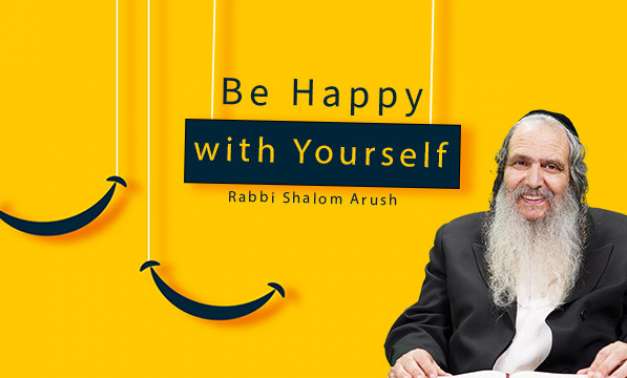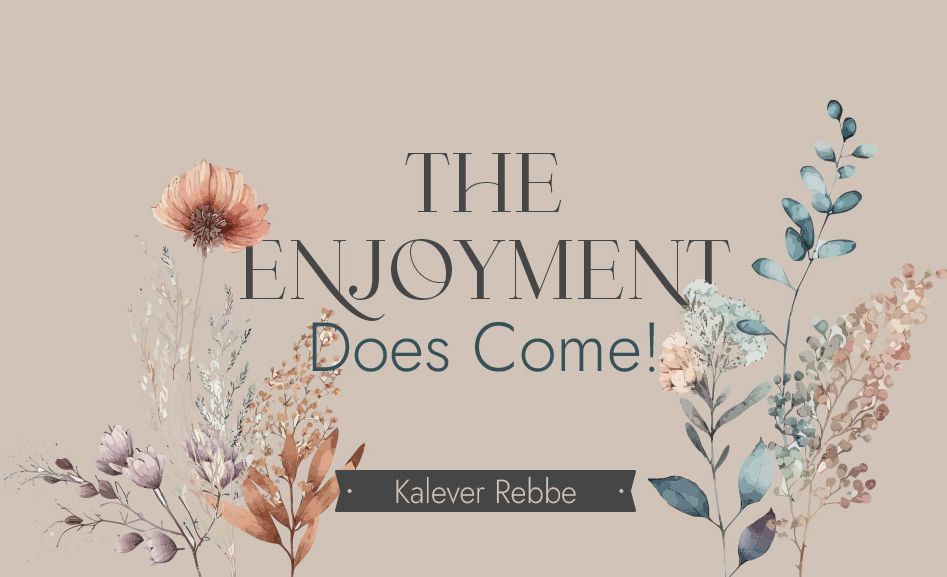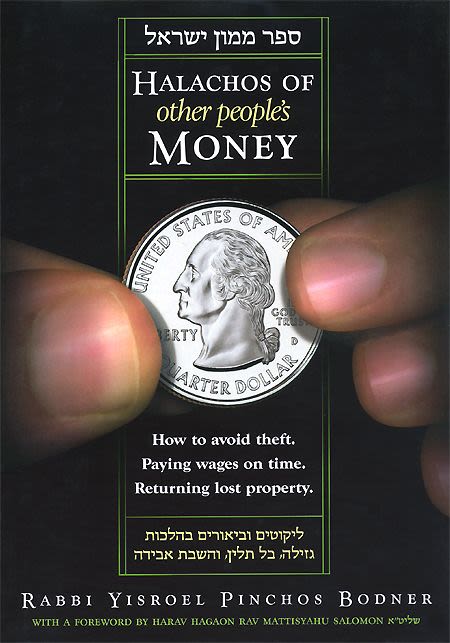
Strangling Stringencies
Holiness and joy are bound closely together; if you're not enjoying your Judaism, then something's not the way it should be. Maybe you're too hard on yourself…

King David says (Psalm 119:99), “I learned from everyone that taught me.” If Hashem sends a person or event in our lives, then there’s surely something to learn.
My high-school wrestling coach was an Irish coal-miner’s son from the hills of Pennsylvania, a self-made man who ultimately earned a PhD in education. He had tons of worldly wisdom and much of what he taught me in life helped me at critical times, especially during my service in the military.
Our coach hung a sign on the ceiling of our training gym with a tongue-in-cheek message that said, “If you can read this sign, you’re losing!” Understandably, anybody that’s lying on his back on a wrestling mat is not in the process of winning the match…
The Torah commands us to be in simcha, to be in a state of joy. That means we should have a smile on our face and not a stern look of hellfire and brimstone. Therefore, when a person is happy, he’s a winner in Judaism. But when he’s not happy – “on his back” so to speak – he’s losing…
Many observant people ask, “I perform mitzvot, but I’m not happy! How can the Torah command me to be happy?”
The answer is quite simple. The Torah commands us to be happy, because if we observe its commandments like we should, then we will be happy.
Lack of happiness in one’s Torah learning, prayer, and/or mitzva performance usually stems from one of two problems, either a lack of emuna or an excess of stringency.
As far as the first problem – lack of emuna – you’ll find many articles on the website that deal with this topic. Yet briefly, the more a person strengthens his emuna and feel’s Hashem’s presence in his life, the happier and vigorously he’ll serve Hashem out of his own choice and free will and not feeling like he is being coerced. That said, let’s concentrate on the second problem, excessive stringencies.
Rebbe Natan writes about several young men back in his time who were very careful about praying only after they had completely relieved themselves of intestinal waste. As such, they’d end up sitting and forcing themselves for hours in the morning, to the extent that they’d miss praying with a minyan altogether. Not only that, some of them had developed severe cases of bleeding hemorrhoids. They justified their actions by quoting the Code of Jewish Law (Orach Chaim, 92:1), namely, that a person shouldn’t pray if he needs to relieve himself.
Word of these young men reached Rebbe Nachman. He laughed, making a joke of how the Evil Inclination (EI) makes people crazy. Then, he shook his head from side to side in pity of these poor young men who torment themselves. If they would have only learned the entire above-mentioned halacha (religious law), they would have seen that if a person is able to delay going to the bathroom for the time it takes to walk about 4 miles, which Jewish law establishes as 72 minutes, then he can certainly pray.
“Besides,” added Rebbe Nachman, “Even if a person would fast for an entire week, his intestines wouldn’t be completely clean!” As such, Rebbe Nachman warned us to steer clear of stringencies that result from over-zealous observance, from partial and selective interpretation of halacha, and from arrogance – the person’s desire to show that he’s holier than everyone else.
 Rebbe Nachman called strangling stringencies, “insanity.”
Rebbe Nachman called strangling stringencies, “insanity.”
The Evil Inclination loves stringencies. No one would heed the EI if it would tell an observant person to eat a ham-and-cheese sandwich or ride in a car on Shabbat. But when the EI digs a pit of stringencies and covers it with a camouflaged paper sign that reads, “Holy people, please step here,” many unsuspecting victims fall in.
It’s now easy to understand how our same Rebbe Nachman who warned about stringencies also warned us to be happy. Why? Stringencies and happiness don’t go together. Funny, but stringencies and arrogance are a marvelous couple. No wonder that happiness and arrogance are mutually exclusive.
One of the worst aspects of stringencies is that those who adopt them lose a sense of balance and proportion in their Judaism. The idiot who sneers at a young lady for not adhering to his version of a modest dress code has not done anything for the holiness of the Jewish people, but he has trampled several d’oraita (specific Torah) commandments such as not loving his neighbor, failing to judge another person fairly, and causing emotional distress to another person, a sever halacha between man and fellow man known as issur onaat devorim.
Many over-zealous young BTs take upon themselves stringencies that make their wives and parents miserable.
Judaism is not a religion of celibacy. A Jewish husband must show his wife in every manner possible how much he loves her. His efforts to climb the ladder of holiness should not be at her expense in any way. She should not even be aware of what he’s doing. In fact, if his personal holiness is true and internal and his eyes, thoughts, and heart are clean from outside contamination, she’ll love him much more. If he uses Judaism as an excuse to to shortcut his conjugal obligations with true joy, then she’ll hate him and his Judaism.
The same goes for parents. If their newly-religious son or daughter looks at them like their treif, they’ll hate teshuva and Judaism. But, if the new BT (Baal Teshuva – newly observant Jew) son or daughter makes every effort to eat at the parents’ house (consult your local rabbi for details), then they’ll be supportive. Mom will be happy to pick up food with the proper hechshers and to fill the cupboard with a supply of throw-away dishes and utensils.
Don’t let stringencies strangle you.
The best way to avoid stringencies and to maintain joyful Judaism is to have a connection with a qualified rabbi and talmid chacham who can answer your questions. Pick someone who you trust and who understands you. Husbands and wives should be sure to agree on the same family posek, rabbinical authority.
May we all find limitless joy in our Judaism, and may our observance bring us to love and care about each other much more, amen!












1/29/2012
Just what I needed to hear, almost…. Thanks for this article: though sometimes I wish I didn't have to work so hard to achieve happiness through mitzvot: something that still eludes me greatly, and I am anything but stringent!!!! I guess my problem is EMUNA. Sometimes I just wish that once we would take that enormous leap into G-d's hands that He would somehow make it all a joy to keep and observe. PLease write a follow up to this article, it's really important.
1/29/2012
Thanks for this article: though sometimes I wish I didn't have to work so hard to achieve happiness through mitzvot: something that still eludes me greatly, and I am anything but stringent!!!! I guess my problem is EMUNA. Sometimes I just wish that once we would take that enormous leap into G-d's hands that He would somehow make it all a joy to keep and observe. PLease write a follow up to this article, it's really important.
1/29/2012
other chumrot too? Wonderful article, Rav Brody! I was wondering about other stringencies — gender-segregated buses, never trimming one's beard, wearing a black coat in the hot of summer, increasing strictness of tzniut (especially clothing) standards over time? Should these and other stringencies common today among charedim, and to some degree other Orthodox groups, be abandoned (or at least questioned) too? In any event, here's the full quote by Rebbe Nachman about stringencies, which is I think important for us all to read in full: "Don't follow excessive stringencies in your practice of the Torah. "God does not rule over His creatures with tyranny" ( Avodah Zarah 3a) – "The Torah was not given to ministering angels" ( Berachot 25b) . Our rabbis have taught that it is proper for each person to choose for himself one mitzvah to observe with particular care in all its fine details ( Shabbat 118b ). Yet even with your chosen mitzvah, you should not be excessively strict to the point of folly. Don't let it make you depressed. Simply try to keep the mitzvah carefully in all its finer points, but without excessive punctiliousness. As for the other mitzvot, simply follow the essential laws without adding extra stringencies. If only we could keep all the mitzvot of the Torah according to the simple interpretation of the law without seeking to go beyond it! There is no need to look for extra stringencies: this is foolish and confusing. The essence of serving God is simplicity and sincerity. Pray much, study much Torah and carry out many good deeds without seeking out or inventing unnecessary restrictions. Simply follow the path of our forefathers. "The Torah was not given to ministering angels." There is nothing that you absolutely must do or else. If you can, you can. But if you cannot: "God exempts a person under duress" ( Bava Kama 28b) . Sichot Haran #235"